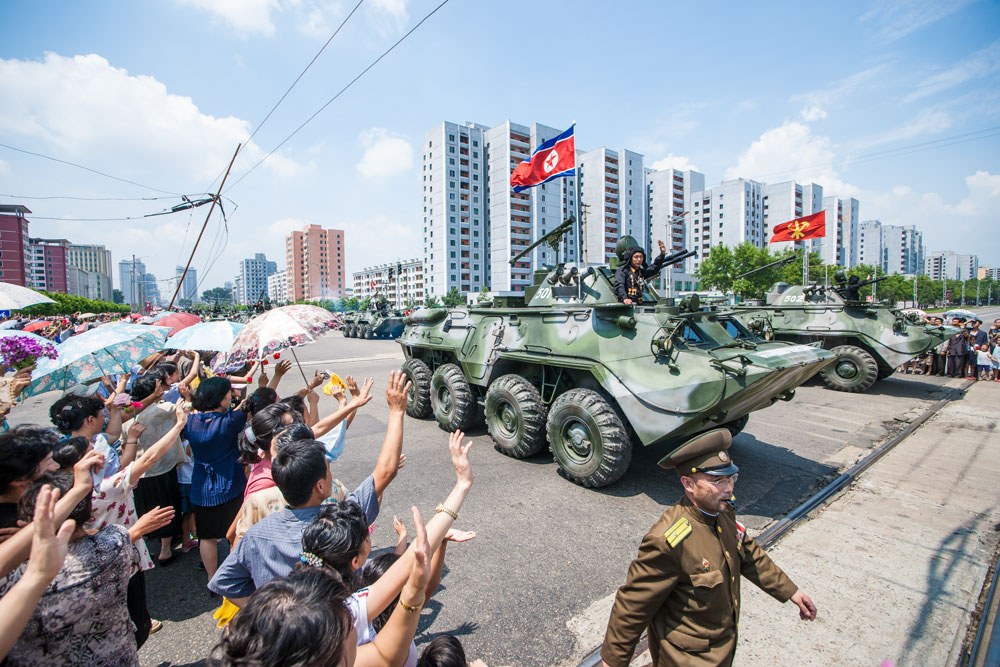
Chicken: When two agents with the freedom to choose non-conflicting paths deliberately choose to travel on a path of imminent collision, each hoping that its resistance to changing paths will force the other agent to change paths.
Currently, the United States is involved in a game of chicken with North Korea. To play chicken implies that there is real threat. Despite the unwavering reassurance provided by the U.S. government that the U.S. has the capability to shoot down any incoming missile (albeit most likely over Russia/Russian airspace), statistics illustrate inconsistent success and uncertainty from the U.S. missile defense systems. But regardless of the America’s ability to shoot down North Korean missiles, the most imminent danger posed by chicken is for the future of humanity.
In “Games Without Frontiers” Peter Gabriel sings “If looks could kill, they probably will” in reference to the 1980 Olympics as the battlegrounds for political egos. Now, as the United States and North Korea vie for the ultimate power play in the game of chicken, the lethal nature of looks is once more becoming increasingly evident. We no longer look at one another as humans, but as pawns. And as pawns, we are disposable for the sake of the king, the president, the dictator or the win. And whether or not the pain of the pawns is visible, what appears as a game to the political operatives who exchange scathing, provocative rhetoric across technogeopolitical space does not come without tears.
In North Korea and the U.S. alike, the threat of nuclear Armageddon and the present lack of love weighs heavily on civilians. While associated fears and tears are obscured by deliberately constructed displays of pride and flawed, or perhaps irrelevant, narratives of national strength, the fears and tears nonetheless exist and provoke interesting ethical questions. We, as a society, are being devastated and face further devastation as the arbitrarily divided face of international competitors. What hope can there be for the future given that level of existing dehumanization? Nuclear weapons harbor immense emotional charge in their very existence. What kind of precedent does it set to threaten use of and to actually deploy nuclear weapons to further nationalist agendas?
Tensions will not dissipate without intentional, deliberate de-escalation. By not choosing to have diplomatic dialogues, we inaugurate a game of chicken by default, as well as its devastating consequences. While a recent shift towards discussion via the “New York Channel” as a diplomatic strategy intended to replace chicken offers hope, it is in itself not enough to support sustainable security. And such security must not be sought in political power, but in humanity, for no true security can be sought in political power, let alone the much needed utilitarian security. While the first step towards tension de-escalation is pursuing discussion as opposed to chicken as a diplomatic strategy, such a step needs to be followed. Humanity must be taken off the bargaining table where it currently rests as a potentially viable sacrifice for political power. Humanity must become the end goal, to which political power is simply a means. And accordingly, re-humanization must become the ultimate priority, at whatever political costs it comes.
One does not show bravery in chicken, but stubbornness, by refusing to move despite imminent danger. The most overlooked aspect of chicken is that if neither party budges, regardless of whose territory they collide on, both parties get hurt. There is universal damage; no one wins. If someone budges in the game of chicken, it does not show cowardice, but demonstrates intelligence, human compassion and empathy. If we budge early, it shows wisdom, a knowledge and conscientiousness of the past and dedication to the future. If we budge late and beg for mercy, it shows innate instincts taking over, and us moving to save ourselves in the present, not moving for the sake of setting a precedent for universal well-being.
So, we must shift from the collision path promptly. In doing so, we save ourselves from imminent devastating collision, and begin the re-humanization process necessary for immediate psychosocial relief and a sustainable, harmonious future.


